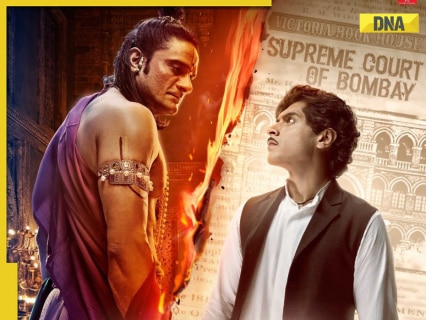
Maharaj, Junaid Khan’s debut, faced controversy after religious groups demanded it be banned. While the film does not offend religious sensibilities, it does not understand its hero one bit
Till last week, not many were aware that a film called Maharaj was supposed to release on Netflix. It starred Junaid Khan, Aamir Khan’s son in his debut, and was based on a milestone legal case. But then, a petition from religious groups in the Gujarat High Court saw its release being deferred. After a case that lasted a week, Maharaj was finally cleared. It does not hurt religious sensibilities. But sadly, it does hurt logic and the idea of progressive thought itself. Maharaj hurt me as an audience member, and not for the reasons the VHP or Bajrang Dal were worried about.
Maharaj is a fictionalized account of what led to the Maharaj Libel Case of 1862, a landmark case in Indian legal history. Junaid Khan plays Karsandas Mulji, a social reformer and journalist who had written an article exposing the sexual exploitation of female devotees at the hands of Jadunath Maharaj, a leader of the Pushtimarg sect of the Vaishnavas. The article led to the maharaj filing a case of defamation, which eventually Mulji won.
The problem is not in the subject or even Maharaj’s understanding of the case or Pushtimarg’s teachings. It is simply how the film projects an extremely problematic character as the knight in the shining armour. Karsandas discovers that the Maharaj (played fantastically by Jaideep Ahlawat) has coerced his fiancée Kishori (Shalini Pandey) into having sex with him. The first instinct of our hero is to berate the girl and tell her ‘tumse yeh umeed nahin thi’. It all goes downhill from here.
Every step from there on, this learned Karsandas, the man who advocated for widow remarriage and women’s education, refuses to see the power imbalance between Kishori and the Maharaj, the man whom she worships. His anger is towards his fiancée and her ‘mistake’ and not towards the actual predator in the room. I was willing to excuse this given the Victorian setting of the film and that a little conservatism is to be expected in the 1860s. But as the film progresses, Kishori – the victim – descends into a spiral of self-blame while the man who is to help her leaves her on her own. Conservatism aside, these are not the actions of a hero.
The great redemption arc that follows does not come from any admittance of wrongdoing on Karsandas’ part as well. It comes from a need for ‘revenge’, to right the wrongs done by the Maharaj to her and all the other girls like her. But dear Karsan, what of the wrongs you have done to her? You gaslit her, led her to believe she was responsible for being manipulated and abused, and then left her alone. The story of Maharaj could have been about a man who stands up for the woman he loves after she is wronged by a powerful and influential figure. Yet, it was about a man who abandons her and then leads a crusade in her name, all the while not realizing that he was wrong to blame her. Naivety is not a crime big enough to be ostracized for.
And despite all this, Maharaj wants us to believe that this Karsan is a hero. They don’t even bother to project him as a flawed individual. He is righteous all the way through, a beacon of hope in this otherwise dark world. The hypocrisy between his actions and words make him a rather unlikable person and an odd choice to be the knight in shining armour.
I will always fight for a film’s right to be screened, regardless of whoever thinks it is offensive. But sometimes, when a mediocre misguided film is the centre of such a controversy, I do wonder if I was better off in a time not having watched it.
The DNA app is now available for download on the Google Play Store. Please download the app and share your feedback with us.



